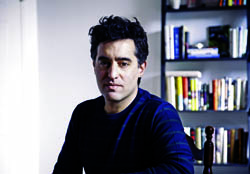By Emily K. Alhadeff , Assistant Editor, JTNews
On the page, noted author Nathan Englander is clear and concise, like each word has been polished and placed alongside the others on a trophy shelf. When he speaks, however, his thoughts come at a pace that could best be described as frenetic.
Englander and I spoke between a Washington, D.C. hotel room and a cab ride to a reading on his book tour, taking two short breaks in our casual conversation to change into a suit and brush his teeth, then to take the elevator without aggravating fellow riders.
On how he views his success, or shortcomings, as a writer, “That’s the best part,” he said. “There’s only your work. Nothing ever really feels like anything. You know what I’m saying?”
And postmodernism claims another victim.
Englander’s collection of eight short stories, What We Talk About When We Talk About Anne Frank, hit the shelves to critical accolades, riding on the popularity of the title story that appeared in The New Yorker in December. His book tour brought him to Seattle Feb. 16.
Englander, 40, has one novel and two short story collections in print, all of which draw upon themes from the Jewish religious and cultural context his life is steeped in. Having grown up in a religious community on Long Island, it was only in Israel as a young adult that he disavowed Orthodoxy. After one week in Jerusalem, where he encountered secular Israelis, Englander turned toward a non-religious life.
“I often feel a connection to peoples’ stories about coming out of the closet,” he said.
What We Talk About When We Talk About Anne Frank traverses the landscape of Jewish identity. The pages interact with defectors from the faith, Israeli pride and zealotry, bullies and their scrawny yeshivish victims, even Englander’s own family. And let’s not forget the Holocaust and anti-Semitism (or the perception thereof), their dull drumbeats never lingering too far off.
In the title story, we meet two couples, secular and ba’al teshuvah, bonding over marijuana, munchies and confessions until the ultimate, ugliest, most honest confession comes to bear. “Sister Hills” captures the birth and development of a West Bank settlement, and a twist on a Faustian bargain that, perhaps, determines its fate; in related form, “Fruit for Young Widows” deals with Israel’s wars and the dynamic relationship between two soldiers over time. “Camp Sundown,” in which elderly campers take revenge on a man whom they think they recognize as a Nazi, stands apart in originality and darkness.
Despite the loaded themes, the stories step back at moments of judgment, leaving in their wake a cloud of moral dust. The characters are often left looking at one another, unsure what to make of themselves.
In this light, Englander’s vague, postmodern responses make more sense.
He says his story ideas don’t come from one place or with any agenda, and he describes his inspiration base as a “word cloud.” When he began writing “Sister Hills,” which he named as his most challenging story, “When I had a few pages down I didn’t even know if the words made sense,” he said. “It was just so all-consuming.”
And how he came up with the twisted premise for “Camp Sundown”?
“I can’t even tell you,” he said. “I remember seeing turtles in a lake.”
Somehow, he said, this got him to John Demjanjuk and Nazis. And summer camp. And the elderly.
“My obligation is to the story. I really feel connected to them all in different ways,” he said. “You get these lessons you didn’t expect…to me its become this nice thing. That’s what a living thing should be.”
Like other Jewish American writers, Englander spurns the “Jewish American writer” description.
“That’s the point. You’re describing my work,” he said. “Stories are universal. I’m an American writer. My whole family is from America. I refuse to see my fiction as other.
“It must be somebody else’s choosing. It’s a category that comes from the outside.
Is it about circumcision or craft or what?”
Nonetheless, Englander, who has been compared to Bernard Malamud and Isaac Bashevis Singer, seems to fall into a class of contemporary “Jewish American writers,” and his prose shares qualities, at times, with Jonathan Safran Foer, Etgar Keret and Shalom Auslander. (He has a Haggadah coming out with Safran Foer, and he co-translated Keret’s latest story collection from the Hebrew.) He’s flattered to be considered part of this line of Jewish literary giants, but again, avoids putting himself there.
“I’m sure I play that game all the time,” he said. “Dylan’s better than the Stones. But the Stones might think differently. And don’t even mess with the Beatles fanatics…. As the person who was dreaming of being a writer, this is the life I dreamed of. It’s not for me to absorb it. You have to believe in the work.”
